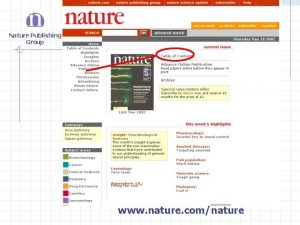NATURE OF INSURANCE HISTORY OF INSURANCE WHAT IS














- Slides: 14

NATURE OF INSURANCE

HISTORY OF INSURANCE

WHAT IS INSURANCE? Insurance Defined Insurance can therefore be defined as: “An economic institution based on the principal of mutuality, formed for the purpose of establishing a common fund, the need for which arises from chance occurrences of nature, whose probability can be fairly estimated. ”

ESSENTIAL FEATURES OF INSURANCE The essential features of insurance, therefore, are: I. It is an economic institution. II. It is based on the principle of mutuality or cooperation. III. Its objective is to accumulate funds to pay for claims that arise as a result of the operation of specific risks. IV. Only certain risks can be insured against, namely those whose occurrence can be confidently estimated with a certain degree of

FUNCTIONS OF INSURANCE PRIMARY FUNCTION The primary function of insurance is the equitable distribution of the financial losses of the few who are insured among the many insured.

o Stabilization of Costs o Stimulation of Business Enterprise o Provision of Security for Expansion of Business o Reduction of Losses o Provision of a Means of Saving o Provision of Sources of Capital for Investment o Provision of Employment for Many

HOW INSURANCE WORKS? i. Pooling of Risks The contribution from the 1000 house owners or life assured results in the creation of an insurance fund of RM 200, 000. The insurer uses this amount of money to pay for claims, management expenses and other outgoes such as commission, taxes, etc. The balance, if any, constitutes the insurer’s profit.

The law of large numbers states that as the number of loss exposures increases, the predicted loss tends to approach the actual loss. Although the law of large numbers is a simple concept, it can only operate efficiently if the following requirements are fulfilled: • There a large number of similar loss exposures. • The loss exposures must be independent. • There is a random or chance occurrence of loss. The operation of the law of large numbers will ensure better prediction of future losses. This is important to insurers because they must charge a premium (based on predicted future losses) that will be adequate for paying losses for the period of insurance.

WHAT IS INSURANCE PREMIUM? When you sign up for an insurance policy, your insurer will charge you a premium. This is the amount you pay for the policy. Policyholders may choose from a number of options for paying their insurance premiums. Some insurers allow the policyholder to pay the insurance premium in installment usually monthly or semi-annually, while others may require an upfront payment in full before any coverage starts. The price of the premium depends on a variety of factors including: • The type of coverage • Your age • The area in which you live • Any claims filed in the past • Moral hazard and adverse selection For example, in the case of motor insurance policy, the likelihood of a claim being made against a teenage driver living in an urban area may be higher compared to a teenage driver in a suburban area. In general, the greater the risk associated, the more expensive the insurance policy (and thus, the insurance premiums). In the case of a life insurance policy, the age at which you begin coverage will determine your premium amount, along with other risk factors (such as your current health). The younger you are, the lower your premiums will generally be. Conversely, the older you get, the more you pay in premiums to your insurance company.

CHARACTERISTIC OF INSURABLE 1. Financial Value INTEREST 2. 3. 4. 5. Large Number of Similar Risks Pure Risks Only (possibility of loss or no loss) Not a Catastrophic Losses ( Fortuitous Losses (accidentally and unintentionally) 6. Insurable Interest (right to insure) 7. Legal and Not Against Public Policy 8. Reasonable Premium

WHAT IS TAKAFUL? Takaful is an alternative to the contemporary insurance contract. Takaful is a form of insurance based on the principle of mutual assistance. Takaful is a noun stemming from the Arabic verb kafala meaning to protect or to guarantee. Essentially takaful means mutual help among a group to support the needy within the group through a fund contributed by group members.

TAKAFUL AND INSURANCE Muslim jurists generally view that conventional insurance, which is based on exchange transaction, does not conform to the rules and requirements of Shariah because of involvement in the following elements either in its buy-and-sell agreement, operations or investments: Al-Gharar – Gharar means uncertainty in the contract of insurance. Al-Maisir – Element of gambling. This means that if a transaction consists elements of Gharar hence there exists an elements of gambling

CONCEPT OF TAKAFUL Takaful operation incorporates the concept of Takaful that applies the concept of Tabarru’ and the principle of Mudharabah. The Concept of Tabarru’ means donation, gift or contribution. By definition, Tabarru’ is the agreement (Aqad) by a participant to hand over as donation, a certain proportion of the Takaful contribution that he agrees or undertakes to pay, thus enabling him to fulfill his obligation of mutual help and joint guarantee should any of his fellow participants suffer a defined loss. The concept of Tabarru’ eliminates the element of uncertainty in the Takaful contract. The Principle of Mudharabah (trustee profit-sharing) is defined as a contractual agreement between the provider of capital and the entrepreneur for the purpose of business venture whereby both parties agree on a profit-sharing arrangement. The principle of mudharabah when applied to the takaful contract defines the takaful company as the entrepreneur who undertakes business activities. The participants entrust funds to the takaful company by means of takaful contributions. The takaful contract specifies the proportion of profit (surplus) to be shared between the participants and the takaful company.

Thanks! Any questions?
 Nature of fire insurance contract
Nature of fire insurance contract Nature of risk meaning
Nature of risk meaning Nature and nature's law lay hid in night meaning
Nature and nature's law lay hid in night meaning Determinace lidské psychiky
Determinace lidské psychiky Climbs insurance products
Climbs insurance products History of insurance
History of insurance Also history physical
Also history physical Laura herrera scott
Laura herrera scott Insurance declaration page example
Insurance declaration page example Networked insurance
Networked insurance Ttuhsc health insurance
Ttuhsc health insurance Fau employee benefits
Fau employee benefits Vfis firefighters insurance
Vfis firefighters insurance Uw madison student health insurance
Uw madison student health insurance American insurance training
American insurance training


























